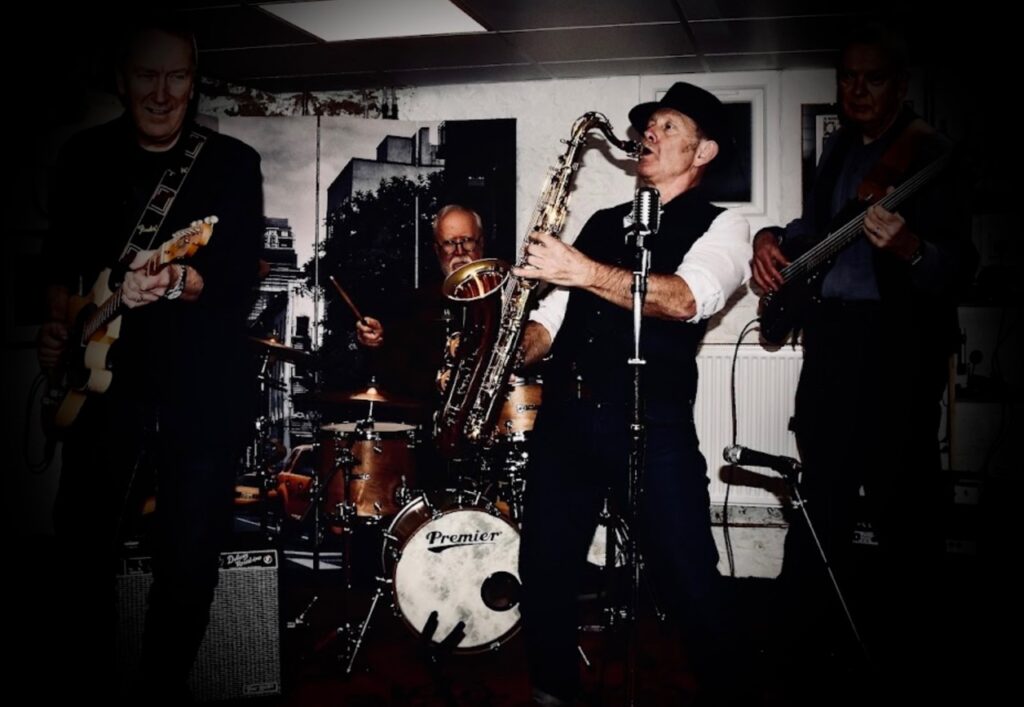With beads of sweat glistening on the speaker finder’s brow like a morning dew, our speaker Jonathan “Jonny” Jones eventually arrived like a whirlwind to deliver the most superb lecture, drawing on his time as a teacher leading a group of Rotherham school kids to the WWI battlefields and war graves, and the inspiration behind his first historical novel “Bugle Boy”.
Jonathan (pictured) grew up in Sheffield and became Head of English and Drama at Oakwood School in Rotherham. He was also a part-time actor. As a child protection officer at the school, he was well placed to handle the complexities of childhood bullying, a theme running throughout “Bugle Boy”. Growing up in a musical family, brass bands were central to his life. He now leads the “Tigermen Blues Band “, performing all over the north of England, and is currently writing a second book.
“Bugle Boy” is about a lad called Harry Jones, an ordinary Sheffield boy with an extraordinary talent for music, and savvy with street games and the freedom of playing in Greno woods. Jonathan was drawing on his own similar childhood memories for the story, so very different from the helicopter parenting existence of many of today’s screen-obsessed children. Harry grows up within a close-knit musical family and was the rising star of his local brass band, playing the cornet. But he was badly bullied.
Through an extraordinary set of circumstances, Harry finds himself amid the carnage of the Western Front where once again he comes across the boy who bullied him throughout his life. As events unfold, Harry begins to understand the darkness in the other lad’s life, explaining the reasons for the bully he became.
The Rotherham school visit to the Somme was to study the war poets at Dud Corner, a WWI military cemetery near Loos, one of several cemeteries and memorials dedicated to those who died in the Battle of Loos and other nearby engagements. Incidentally, Dud has two meanings: shells that failed to explode, or an officer who displays cowardice. It’s derived from medieval English, meaning a counterfeit thing or futile person.
The Battle of Loos (1915) was an Allied offensive on the Western Front, with the first use of mustard gas by the British Army. There were heavy casualties on both sides, nearly 60,000 British, and many killed or missing in action, resulting in numerous unidentified graves. Dud Corner Cemetery was established after the Armistice in 1918. It was created by consolidating battlefield graves and small burial grounds from the surrounding area.
The Rotherham visitors saw the newly prepared grave of an unknown boy bugler, the inspiration for the character Harry in the book. He died when shrapnel hit his cornet, strapped to his chest, then penetrated his skull. His remains lay over the bugle together with his regimental cap badge. He wasn’t the only underage recruit. There were a quarter of a million others in the Great War. The emotional impact of the story on the young Rotherham teenagers was profound – they were a similar age to the bugler, all around 15 years old.
They learnt about Wilfred Owen who wrote exactly as he saw it himself – the horrors of a gas attack. Jonathan dramatically recited one of Owen’s poems (below) during his talk, all from memory. Artillery bombardment had failed. The gas did an about turn as the wind changed, and 8,000 were dead.
Items found after a twenty-minute dig by the group in the battlefield brought the war vividly to life. Jonathan showed us a cast iron gas shell, shrapnel balls, an 18-pounder shell case with date and manufacturer marks, bullets bent on impact with masonry, metal or bone, and empty beer bottles and tobacco tins; boredom in the trenches was helped by alcohol and tobacco.
All references in this historical novel are real and adapted for Harry’s story. Patriotism features large but there is also a theme of bullying and alcoholism running through it.
“Bugle Boy” can be found on the Amazon website.
Dulce et Decorum Est
BY WILFRED OWEN
Bent double, like old beggars under sacks,
Knock-kneed, coughing like hags, we cursed through sludge,
Till on the haunting flares we turned our backs,
And towards our distant rest began to trudge.
Men marched asleep. Many had lost their boots,
But limped on, blood-shod. All went lame; all blind;
Drunk with fatigue; deaf even to the hoots
Of gas-shells dropping softly behind.
Gas! GAS! Quick, boys!—An ecstasy of fumbling
Fitting the clumsy helmets just in time,
But someone still was yelling out and stumbling
And flound’ring like a man in fire or lime.—
Dim through the misty panes and thick green light,
As under a green sea, I saw him drowning.
In all my dreams before my helpless sight,
He plunges at me, guttering, choking, drowning.
If in some smothering dreams, you too could pace
Behind the wagon that we flung him in,
And watch the white eyes writhing in his face,
His hanging face, like a devil’s sick of sin;
If you could hear, at every jolt, the blood
Come gargling from the froth-corrupted lungs,
Obscene as cancer, bitter as the cud
Of vile, incurable sores on innocent tongues,—
My friend, you would not tell with such high zest
To children ardent for some desperate glory,
The old Lie: Dulce et decorum est
Pro patria mori.
- Images published with kind permission of Jonathan “Jonny” Jones, on behalf of the Tigermen
Blues Band


